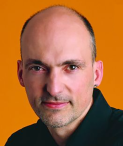Events
May 28, 2025
Seminar (2025-05-28)
School of Biomedical Sciences cordially invites you to join the following seminar:
Speaker: Professor Patrick Kanold, Professor of Biomedical Engineering, Academic Program Co-Director of Biomedical Engineering PhD Program, Johns Hopkins University
Talk Title: Learning how to hear: The influence of early sensory experience and action on early cortical circuits
Date: 28 May 2025 (Wednesday)
Time: 4:00 pm – 5:00 pm
Venue: Lecture Theatre 2, G/F, William M.W. Mong Block, 21 Sassoon Road
Host: Professor Michael Häusser
Biography

Professor Kanold is a neuroscientist and engineer (neuroengineer!) studying the auditory cortex. He is interested in how the brain computes information about the world and how this representation is shaped by experience. He has discovered the key role of a special population of neurons in the developing brain, the subplate neurons. The Kanold lab was one of the first to use optical approaches to discover that “maps” of frequency preference in auditory cortex were disordered on a local scale challenging prior textbook dogma. The Kanold lab was also the first to optically dissect auditory cortical circuits across the lifespan and to show that experience even before ear opening and activation of layer 4 in rodents can shape subplate neuron circuits. His lab combines and further develops in vivo and in vitro optical and electrophysiological methods, high throughput behavioral approaches, and computational analyses to study the circuits and mechanisms underlying auditory perception and plasticity.
Abstract
Our research aims to understand how experiences and interactions with the world shape the brain. Since hearing is a crucial sense for communication in both humans and animals, we focus on the auditory system. We study how sensory representations in the auditory cortex change over time and how they are shaped by experience using in vivo and in vitro imaging and electrophysiological methods. Recent studies from our lab have uncovered insights into the early development and experience-driven plasticity of the auditory cortex.
The brain’s ability to process sounds is established during early development, refined through experience during a “critical period,” and further shaped by lifelong learning. Our findings reveal that the early developing cortex contains specialized circuits formed by subplate neurons. These circuits provide an early foundation for experience-dependent changes, even before the traditional “critical period.”
Our results suggests that both sensory experiences and self-generated actions during early development—before the critical period—can have influences on brain function. Our current research focuses on unraveling the complex nature of these early life experiences and their long-term impact on auditory processing.
All are welcome.

